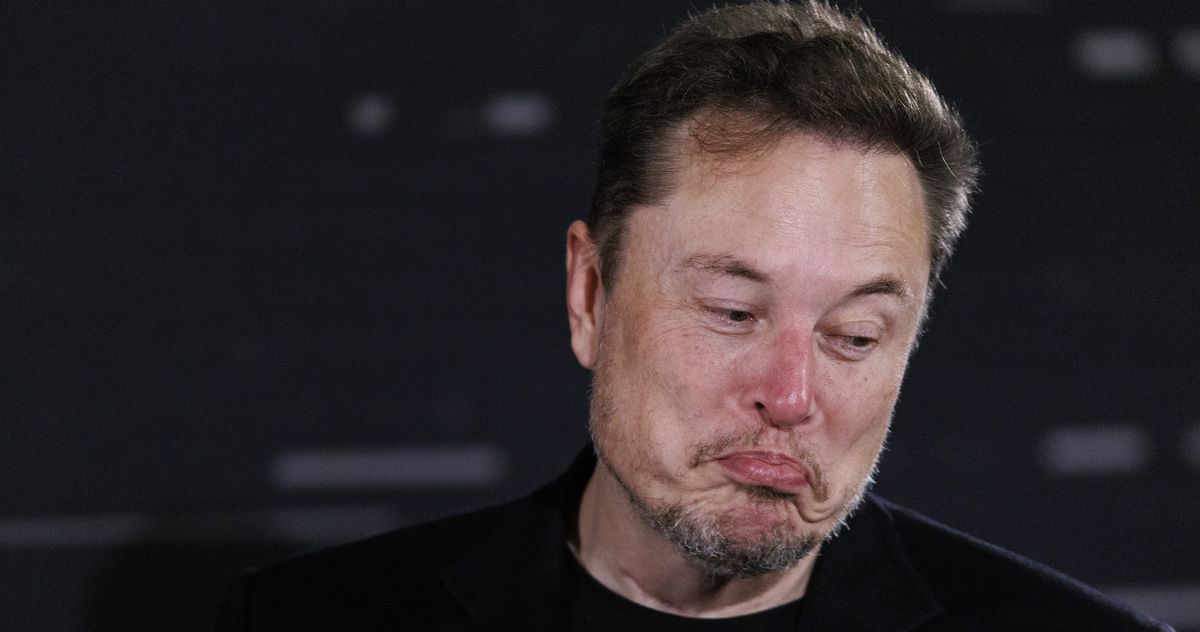Can Elon Musk Pull Off a Mark Zuckerberg?

24/04/2024 21:18
By the time Elon Musk held a conference call with Wall Street on Tuesday night, he had spent most of the last year on the defensive. The call was nominally to discuss Tesla's historically bad earnings that saw net income drop 55 percent last quarter. His largest and most important company has lost half of its value since July and more than two-thirds since its 2021 peak. Some of this could be blamed on factors affecting any electric-vehicle company — interest rates are high, subsidies are drying up, and the buying public is losing their enthusiasm. But there was a deeper concern from Wall Street: Amid fierce competition, Tesla was reportedly abandoning a new, cheaper model. In the span of a few years, the futuristic behemoth had started to look like just another beleaguered EV company — one under scrutiny by federal investigations, with aging models bought by the kind of Democrat-voting bleeding-heart customers Musk tends to insult.
But really, the Tuesday call was not to discuss the past three months' sales figures — in fact, they were hardly mentioned at all. The goal was to revive Musk as a visionary, a tech force of historical stature who could make world-changing promises with his products. He presented a future where Tesla owners would allow their cars to automatically drive off, propelled by Full Self Driving technology (which is not, in fact, autonomous, and is the subject of a wide-ranging criminal investigation) to be used as taxis by anyone hailing a ride nearby. He promised that current auto plants would be utilized to make "new models" by 2025, though it wasn't clear whether these would just be scaled-down versions of cars Tesla already sells.
Musk's next phase for Tesla is, in reality, not very different from what he's presented before — cheaper cars, better technology for its Full Self Driving program. What was different, though, was his confidence in the future. He urged his investors to let the semi-autonomous program take the wheel of their cars. "It's impossible to understand the company if you do not do this," he said. Hours after the call, on Wednesday morning, Tesla's stock rose 13 percent, to about where it was the day the report came out. In the eyes of his two most important constituencies, Wall Street and fanboys, he was back.
This should all sound familiar to anyone paying attention to tech's ruling class over the last 20 years. The turnaround is a key step in the journey of the Great Tech Guy mythology. As a recent example, Mark Zuckerberg has pulled this off to a stunning degree. By November 2022, it looked like Zuckerberg had more or less trashed his company in one of the worst-executed pivots in Silicon Valley history — taking a well-known network (Facebook) and burying it under a new company name (Meta) that relied on expensive, clunky technology that nobody wanted and he himself had a hard time articulating. The company's shares had lost 75 percent of their value — a fall from grace that turned other once-great companies, such as Xerox, into tech zombies. But then, last year, Zuckerberg realized his error. He went in on artificial intelligence to remake his core business, selling ads. Since then, Meta stock has quintupled in value. Not only that, but Zuckerberg has gone about remaking himself — getting kinda jacked, wearing gold chains, letting his hair grow a bit longer than that of his role model, Caesar Augustus.
And so, now in 2024, Musk is trying his hand at a comeback story of his own, and appears to be following Zuckerberg's lead. Wall Street had complained that he had been wayward in his main job at Tesla, which is selling cars. Musk eked out some concessions to that. "We did overcomplicate the sales process," he said at one point during the call.
Hype has always been key to understanding what Tesla is all about — yes, there's always been a lot of bullshit, but Musk made people believe in the company. After Tuesday, he clearly made a lot of people believe him again — at least for now. Musk may have looked around Silicon Valley and seen his peers' reinventions, and the swelling fortunes that came with it, and reasonably concluded that the best way for him to sell cars is to, once again, sell himself.


